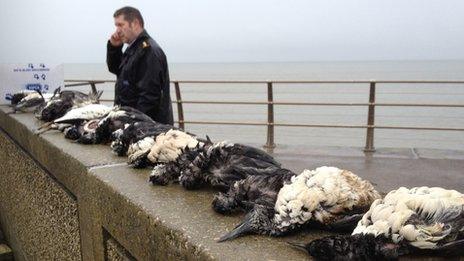Ships banned from discharging seabird pollutant PIB
- Published

Guillemots, auks and razorbills were among the bird species found dead
A pollutant that killed thousands of birds off the coast of Britain earlier this year will no longer be dumped at sea after a worldwide ban was agreed.
More than 4,000 birds were killed or injured by the chemical polyisobutene (PIB) between Cornwall and Sussex, and on the Channel Islands.
The International Maritime Organisation (IMO) has reclassified PIBs from 2014.
It means ships will only be able to wash their tanks and dispose of all PIB residues while in port.
Until now it has been legal for discharges to be made when vessels wash out their tanks, as long as they are further than 12 nautical miles from the nearest point of land.
'Glue-like' substance
The ban had been recommended by the Maritime and Coastguard Agency (MCA), on behalf of the government, and was welcomed by the RSPB, RSPCA and other wildlife charities.
The decision was taken by the IMO at a meeting in London on Monday.
"There was only one entry for PIBs before," said the IMO's Natasha Brown.
"We are keeping the current category but will create a new entry for the high viscosity PIB, which is the problem chemical if you like, in terms of these discharges."
The substance - a lubricant used to improve the engine performance of ships - was found on seabirds, mainly guillemots, in two separate instances between January and May.
In the sea, high viscosity PIB becomes "glue-like", covering birds and restricting their movements and ability to feed, causing them to eventually die from hypothermia or starvation.
In August, the MCA said it had been unable to trace the vessel the contamination spill had come from and closed its investigation.
Adam Grogan, RSPCA senior wildlife scientist, said: "Our staff worked around the clock washing and treating these poor birds in January and April and it was heartbreaking seeing the pitiful state they were in.
"Hopefully this will help stop incidents like these happening again, and save wildlife from suffering and dying like this in the future."
Alec Taylor, from RSPB, said wildlife charities worked hard for the ban, with support from several south coast MPs.
"But the huge support we received from members of the public, many of whom experienced the effects of this pollution first hand as they walked the beaches, was perhaps the clinching factor in achieving such a quick decision to prevent discharges of harmful PIBs," he added.
The IMO is the United Nations agency responsible for the safety and security of shipping and the prevention of marine pollution by ships. It consists of 170 member states, of which the UK is one.
The organisation confirmed a number of other European countries had also been investigating the discharge of "high viscosity products" by chemical tankers, including PIBs.
- Published25 September 2013
- Published20 August 2013
- Published27 June 2013
- Published23 June 2013
- Published3 May 2013
- Published26 April 2013
- Published7 February 2013
- Published6 February 2013
- Published5 February 2013
- Published4 February 2013
- Published3 February 2013
- Published2 February 2013
- Published1 February 2013
- Published1 February 2013
- Published31 January 2013
- Published31 January 2013
- Published19 July 2011